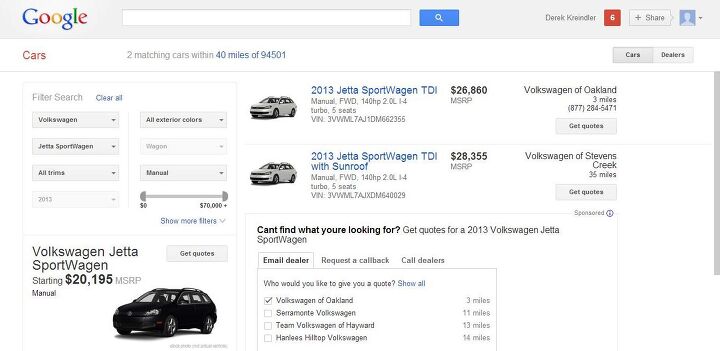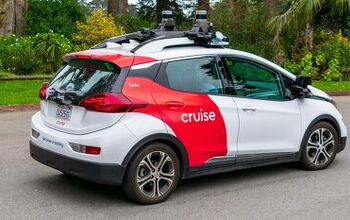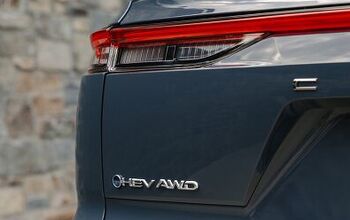Analysis: Google Cars Gets Ready To Retail Rumble
Google’s autonomous car program tends to get the lion’s share of attention when discussing the tech giant’s auto initiatives. But lurking in the background is a more immediate project that has the potential to finally “disrupt” (as Silicon Valley types are so fond of saying) online automotive sales.
The last party to attempt such a feat was TrueCar, an innovative and well-intentioned company that ultimately ran afoul of dealers, regulators and the OEMs. TrueCar was forced to pull itself back from the brink and r e-invent itself as a more dealer-friendly company, a process painstakingly documented by Ed and Bertel before I ever appeared on the masthead.
What TrueCar did was distort the information asymmetry that car dealers rely on to make money. TrueCar was able to provide data on everything from dealer invoice to transaction prices and allowed dealers to compete with one another for a sale – a major taboo in the world of car sales.
Now, Google is rolling out a service, the imaginatively named Google Cars, beyond its initial Bay Area test market. Consumers will be able to log onto Google Cars and use the handy one-stop filter box (rather than clicking through various menus and sub-menus to boost a given site’s pageview count) and get inventory, pricing and retailer information for the exact car they’re looking for, down to the color. With 66 percent of dealer website visits arriving from Google, it only makes sense for the tech giant to try and capture some of that value. Under the Google program, users can shop for their cars via the first page of any given Google search. Google will get a minimum of $10 per lead, which is determined by a bidding system. One California Toyota dealer told Automotive News that he was paying $22 per car and $26 per truck or crossover, slightly more than the $20 paid to competing services.
Reviews have been mixed, according to AN. Some dealers like the flexibility of bidding for leads, while others expressed frustration that potential customers can contact dealers anonymously (via disposable phone numbers or email accounts, which expire after a set number of unanswered calls or emails), which they say diminishes the effectiveness of the leads.
Regardless of the potential issues, Google Cars cannot be ignored. Google’s massive size and resources will allow it to be far more aggressive than TrueCar ever was when interacting with dealers and OEMs. Regulators may be a thorn in Google’s side (never underestimate the lobbying power of NADA and other dealer bodies), but again, it has the resources to put up a proper fight against the usually dominant entities.
On a smaller scale, Google Cars is likely to cause a lot of headaches for the established players in the online auto retail spaces. Current juggernauts like Edmunds, Kelley Blue Book, Cars.com and even TrueCar are all threatened by Google Cars, thanks to the strength of the Google brand and most of all, the superior user experience. Once consumers know that they can access a high-quality car shopping tool without ever leaving Google and have the benefit of Craigslist-style anonymity it will be a tough sell for the other sites to get their customers back. About the only criticism levied at Google Cars in this area is the lack of content, like car reviews and automotive news. But Google has never been a content company and they are wise in avoiding this space. Better to aggregate the near-infinite amount of automotive content (aggregation is one of Google’s strengths, after all) that will likely be consumed by dedicated auto enthusiasts rather than consumers. A successful Google Cars could also cause indigestion further down the on-line food chain, at sites that live mostly off selling leads, and who dress-up the lead generation with content, which all too often is not their own.
Aside from the millions it should generate for Google, the car shopping tool is yet another way for them to collect data on consumer purchases. In this case, Google will amass significant personal information relating to what is likely the second largest purchase of one’s life, data that goes beyond whether you like a tan interior or a manual transmission. Google already can sense purchase intent from your browsing data, actively perusing a shopping service would confirm this intent. Yes, it’s ironic considering that Google subscribes to the idea that “ information wants to be free“, but there’s a reason behind the internet adage “if you’re not paying for it, you are the product”.
More by Derek Kreindler
Latest Car Reviews
Read moreLatest Product Reviews
Read moreRecent Comments
- Groza George I don’t care about GM’s anything. They have not had anything of interest or of reasonable quality in a generation and now solely stay on business to provide UAW retirement while they slowly move production to Mexico.
- Arthur Dailey We have a lease coming due in October and no intention of buying the vehicle when the lease is up.Trying to decide on a replacement vehicle our preferences are the Maverick, Subaru Forester and Mazda CX-5 or CX-30.Unfortunately both the Maverick and Subaru are thin on the ground. Would prefer a Maverick with the hybrid, but the wife has 2 'must haves' those being heated seats and blind spot monitoring. That requires a factory order on the Maverick bringing Canadian price in the mid $40k range, and a delivery time of TBD. For the Subaru it looks like we would have to go up 2 trim levels to get those and that also puts it into the mid $40k range.Therefore are contemplating take another 2 or 3 year lease. Hoping that vehicle supply and prices stabilize and purchasing a hybrid or electric when that lease expires. By then we will both be retired, so that vehicle could be a 'forever car'. And an increased 'carbon tax' just kicked in this week in most of Canada. Prices are currently $1.72 per litre. Which according to my rough calculations is approximately $5.00 per gallon in US currency.Any recommendations would be welcomed.
- Eric Wait! They're moving? Mexico??!!
- GrumpyOldMan All modern road vehicles have tachometers in RPM X 1000. I've often wondered if that is a nanny-state regulation to prevent drivers from confusing it with the speedometer. If so, the Ford retro gauges would appear to be illegal.
- Theflyersfan Matthew...read my mind. Those old Probe digital gauges were the best 80s digital gauges out there! (Maybe the first C4 Corvettes would match it...and then the strange Subaru XT ones - OK, the 80s had some interesting digital clusters!) I understand the "why simulate real gauges instead of installing real ones?" argument and it makes sense. On the other hand, with the total onslaught of driver's aid and information now, these screens make sense as all of that info isn't crammed into a small digital cluster between the speedo and tach. If only automakers found a way to get over the fallen over Monolith stuck on the dash design motif. Ultra low effort there guys. And I would have loved to have seen a retro-Mustang, especially Fox body, have an engine that could rev out to 8,000 rpms! You'd likely be picking out metal fragments from pretty much everywhere all weekend long.


































Comments
Join the conversation
I just spent about 20 minutes there. Pretty handy, although all the options / packages searches didnt totally work. But you can use the price filter to narrow the field within the trim line. So if you want a Sienna LE with Nav, its pretty quick to get a list of what's avail For HOnda Oddy it was even easier. No options, just trim lines. I'll use next time I buy
Sounds great, if they can pull it off, it will put a world of hurt to some sites for sure, and some dealers too. Best/easiest experience I had was when I bought my 2003 Ram online. Lots of emails back and forth, bottom line prices were given freely and they were unbeatable, and a phone call sealed the deal. Sadly, the internet guy they had then quit, and his replacement isn't really worth a damn. I tried to get a price on a car recently and the usual old tired games came out and I bailed.